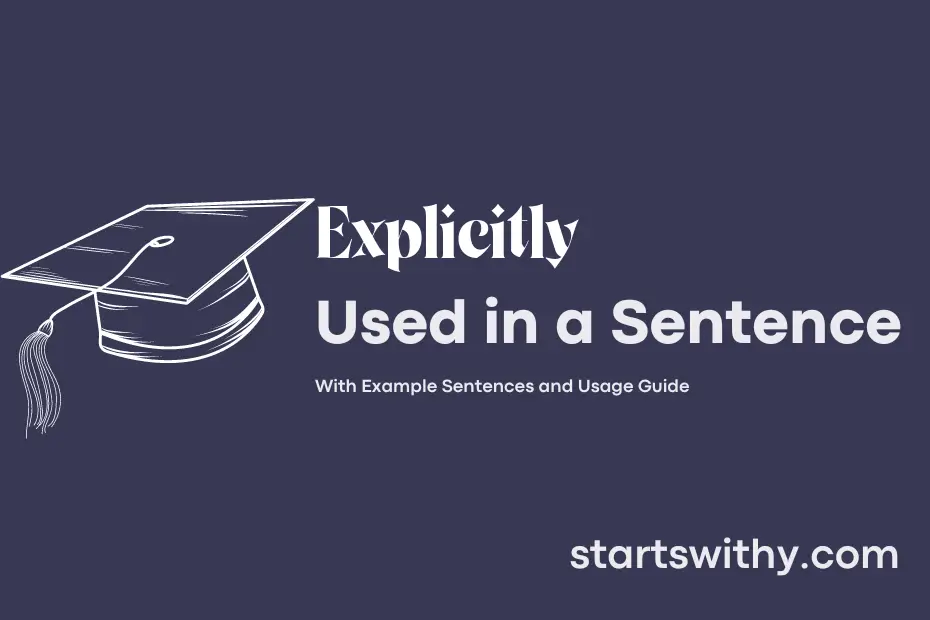Looking to enhance your language skills through clear and direct communication? Understanding how to use the word “explicitly” can make your statements more direct and unequivocal. When you explicitly state something, you leave no room for misinterpretation or confusion.
By using “explicitly” in your sentences, you can ensure that your message is conveyed with precision and transparency. This word is a powerful tool in expressing ideas clearly and leaving no doubt in the minds of your audience.
7 Examples Of Explicitly Used In a Sentence For Kids
- Explicitly follow the teacher’s instructions.
- Make sure to explicitly ask for help if needed.
- Listen explicitly during story time.
- Explicitly raise your hand before speaking.
- Remember to explicitly say thank you.
- Explicitly share your toys with friends.
- Always explicitly be kind to others.
14 Sentences with Explicitly Examples
- Before the exam, the professor explicitly stated which topics would be covered.
- The syllabus explicitly outlined the grading criteria for the course.
- The lab instructions explicitly detailed the steps for conducting the experiment.
- The assignment guidelines explicitly mentioned the required word count.
- The plagiarism policy was explicitly stated in the student handbook.
- The professor explicitly instructed students to cite their sources in the research paper.
- The academic integrity code explicitly prohibited cheating on exams.
- The course outline explicitly listed the required textbooks and materials.
- The software usage policy explicitly stated which programs were allowed on university computers.
- The scholarship requirements explicitly outlined the GPA needed to qualify.
- The peer review process explicitly detailed how to provide constructive feedback on classmates’ work.
- The internship guidelines explicitly stated the dress code for professional events.
- The research proposal explicitly described the methodology to be used in the study.
- The career services office explicitly provided guidelines for writing a resume and cover letter.
How To Use Explicitly in Sentences?
Explicitly means clearly and in detail. When you want to make something absolutely clear or leave no room for doubt, this is the word to use.
To use Explicitly in a sentence, first think about what information you want to make crystal clear to your audience. For example, “I explicitly asked her to finish the report by Friday,” means you clearly stated the deadline without any ambiguity.
When constructing a sentence using Explicitly, try to make your point directly and leave no room for misunderstanding. For instance, “The rules explicitly state that all guests must leave by 10 p.m.,” leaves no room for interpretation or confusion about the time guests need to depart.
Remember that using Explicitly can help you avoid miscommunication or misinterpretation of your message. It’s especially useful when conveying important instructions, guidelines, or expectations.
In summary, when you want to be absolutely clear and leave no room for confusion or doubt in your message, use Explicitly. Practice by incorporating this word into your writing and conversations to effectively convey your ideas.
Conclusion
In this article, several sentences with explicitly have been provided to highlight how this word is used to clearly convey information or instructions. When something is explicitly stated, it is expressed in a clear and direct manner, leaving no room for misunderstanding or confusion. By using explicit language, writers and speakers can ensure that their message is communicated effectively and precisely.
Whether in writing or conversation, using explicitly can help to eliminate ambiguity and ensure that the intended meaning is understood by the audience. By explicitly outlining details, requirements, or expectations, individuals can avoid misinterpretation and promote clarity in their communication. Overall, the use of explicitly can enhance comprehension and make information more accessible and easy to understand for all parties involved.



